There’s so many cleaners, lubricants, and tools out there for cleaning a firearm. After almost two decades of cleaning firearms, I thought I’d share my setup for cleaning and lubricating both rifles and pistols.
They do make all-in-one gun cleaning kits that usually have most of what you need. But I find that I always need to add something, or it has something extra I don’t need in it.
This list is just everything I use and in what order. So you can get an idea of what an efficient setup looks like to help you find a kit that will work for you, or piece together a kit like I do.
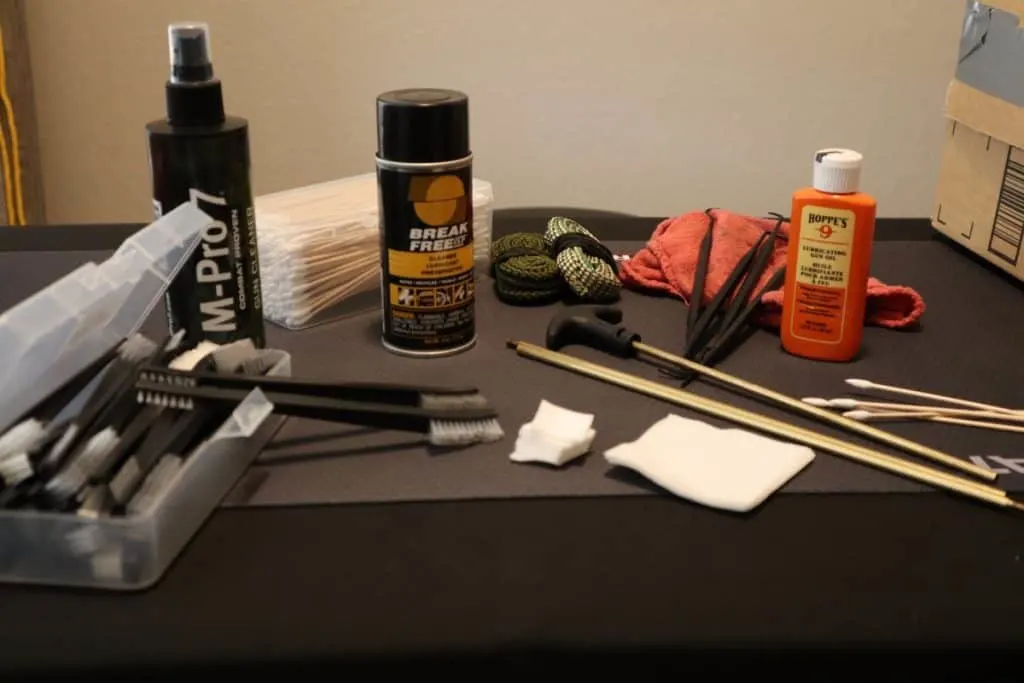
CLP or Clean and Lubricate Separately
The two most popular ways to clean a firearm are by using a cleaning and lubricant combination (CLP), or by using a cleaner to clean the weapon, and then a separate lubricator (gun oil) to lubricate.
I personally use a cleaner to clean the weapon completely, and then just lubricate the parts that need it using a gun oil afterwards.
However, I have spent several years of my life cleaning my firearms with only a cleaning/lubricant combination like CLP and I don’t see anything wrong with doing it that way.
In fact, that’s how the Army does it. Each soldier is issued some CLP to keep their weapons cleaned and lubricated with.
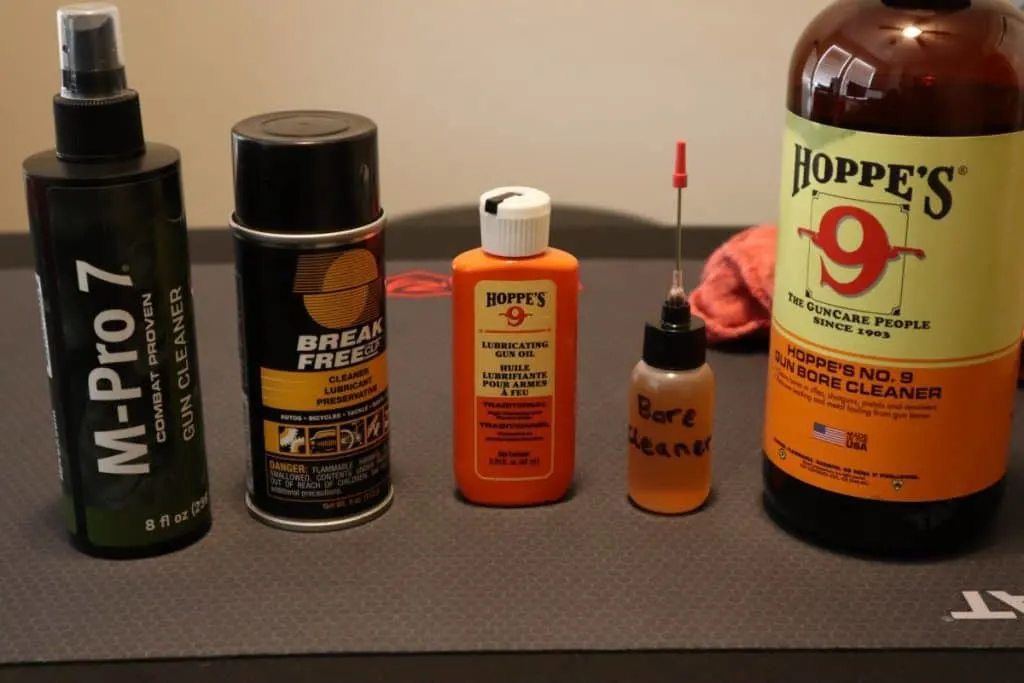
Break-Free CLP
I would recommend using Break-Free CLP (link to Amazon) if you plan on going the combination cleaner/lubricant route.
CLP is generally inexpensive and many companies have made their own versions of it. Any cleaner/lubricant combo is essentially CLP so go with the one you like the best.
CLP stands for Cleaning Lubricant Preservative and is what I was issued in the Army and has been popular in the industry for many years. It can be used on bicycles, boats, fishing gear, cars, and many other things.
But that’s exactly why I stopped using it myself. It can be used for so many things, but it’s not exceptional at one thing. And besides, the entire firearm doesn’t need to be lubricated, which is essentially what you’re doing when you clean it with CLP.
Clean And Then Lubricate
This is how I clean my firearms now. Completely clean out all the carbon and build up that occurs from firing, wipe the weapon dry, and then lubricate the spots that need lubricating.
I’ve used Hoppe’s Bore Cleaner (link to Amazon) and still do. But only because I didn’t check the size of bottle I ordered and have a giant tub of it to go through. It’s a great cleaner and does the job well.
For the last couple years however, I’ve been using M-Pro 7 Gun Cleaner (link to Amazon) and I haven’t looked back.
I also picked up a bottle of M-Pro 7 Gun Oil LPX (link to Amazon) and those are the only two bottles I need to clean and lubricate all of my firearms.
Some shooters will use grease or even motor oil to lubricate their firearms. I’ve done it before to try it out and see no issues doing it that way. I just personally prefer to use a gun oil that is made specifically for the job.
I’m glad I switched from a CLP to using a cleaner and lubricant separately because the cleaner just works so much better than CLP ever has for me. You really do need a solvent to get all the build up out of the barrel anyway.
Even if you decide to use CLP, I still recommend a bore cleaner or solvent cleaner like M-Pro 7 Gun Cleaner to clean the barrel.
Copper and powder will get trapped in the barrel and if you don’t clean that out properly it could cause problems down the road.
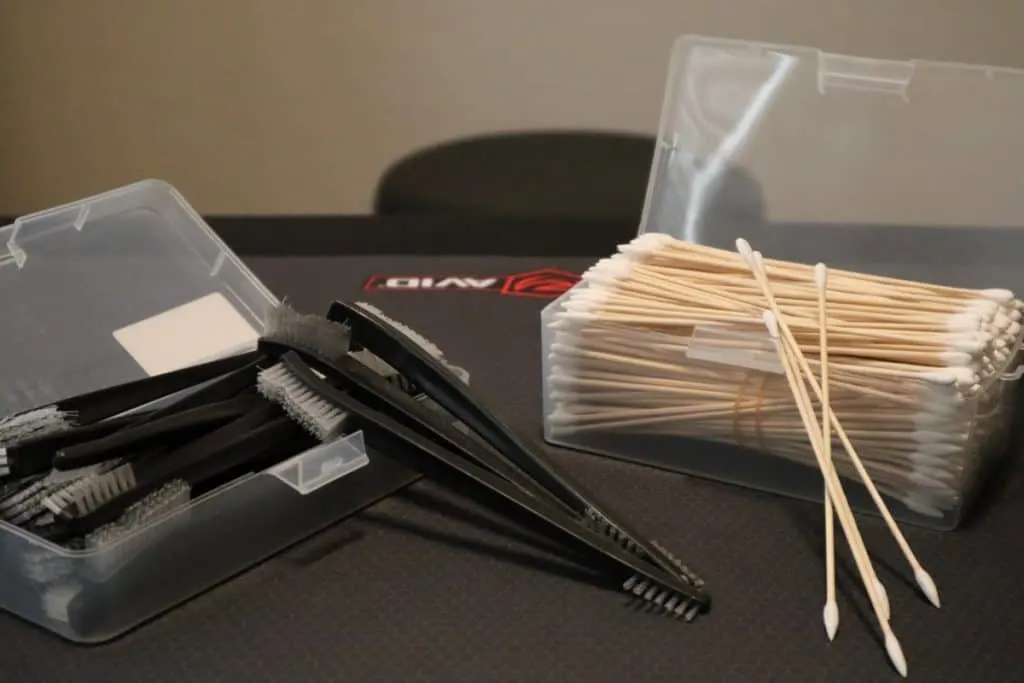
Best Brushes For Cleaning A Firearm
Brushes are essential for scrubbing off the carbon build up after a day at the range. They do make really nice brass brushes that work great at cleaning the grime off, but even a toothbrush will do the job with a good gun cleaner.
I just buy a pack of the Nylon Gun Cleaning Brushes off Amazon for about 10 bucks and they last a good while.
Add in a pack of Gun Cleaning Swabs for those hard to reach areas, and you’re good to go.
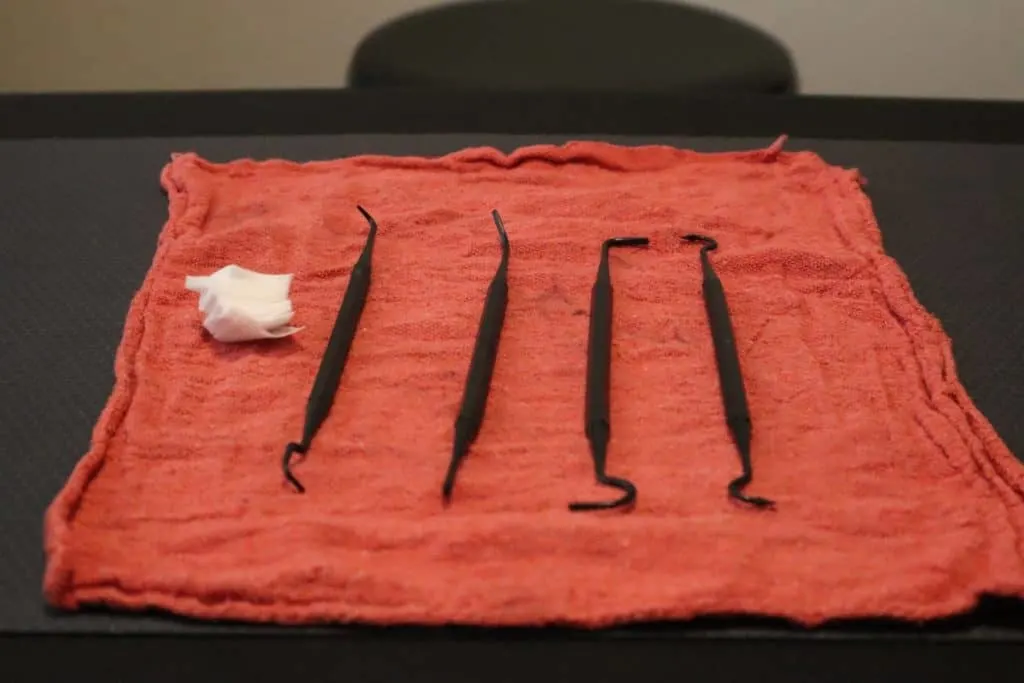
Firearm Cleaning Picks To Remove Carbon Build Up
Sometimes the carbon will build up to point where you just want to scrape it off with something. That’s where Firearm Cleaning Picks (link to Amazon) come in handy.
They’re inexpensive and help a great deal with cleaning bolt faces, extractors, and other hard to reach areas. Use a patch soaked with cleaner and a push it around with a pick where you see build up.
Be careful with the metal picks though. If you go with metal picks, make sure it’s a soft metal. Steel picks can damage the finish on your firearm. I use high strength polymer picks so I don’t need to worry about that.
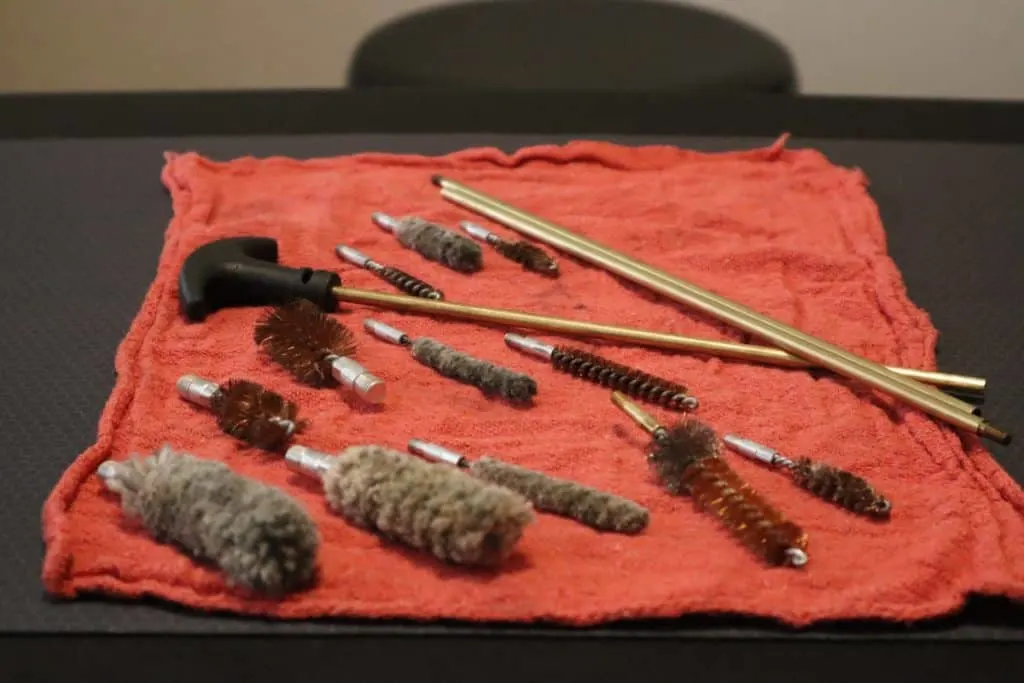
Bore Brush or Bore Snake For Barrel Cleaning
Should you use a bore brush and rod setup or a bore snake to clean the barrel? Well, I have both and I use both. It’s really personal preference here and I don’t see any major advantage of one over the other.
Maybe I’m a little inclined to the brush and rod because I learned that way to begin with. But a quality bore snake like this Hoppes Bore Snake on Amazon will have a brush built in.
You can wash them in between uses, and I’ve got to say, I’ve been using mine more and more lately and I like it. It’s faster, easier, and they’ve become a lot more affordable.
- You just soak the bore snake with cleaner
- Drop the brass end down the barrel
- And pull the snake through to clean the barrel out
- You may need to pull it through multiple times, but it’s the same with the rods
- Take a rag a get the cleaner off the snake (or wash it off)
- Then soak it with gun oil and pass through again
- Take a rag and remove most the gun oil off the snake
- Then pass it through again to remove any excess oil left in the barrel
You just want the barrel slightly oiled, and the bore snake makes easy work of it. Too much oil in the barrel can cause problems with some firearms.
Gloves And Mats For Protection While Cleaning Firearms
Wearing gloves to clean a firearm is one of those topics that can be debated for hours. Some people have never worn gloves, some people will always wear gloves. What it comes down to is personal preference.
I’m not worried about gun oil or lubricators, and some cleaners are even made to be non-toxic now. But what about all the lead, metals, and gunk your cleaning off your weapon?
I’ve gone for years cleaning and working on firearms without wearing gloves. However, I’ve been wearing them more often lately.
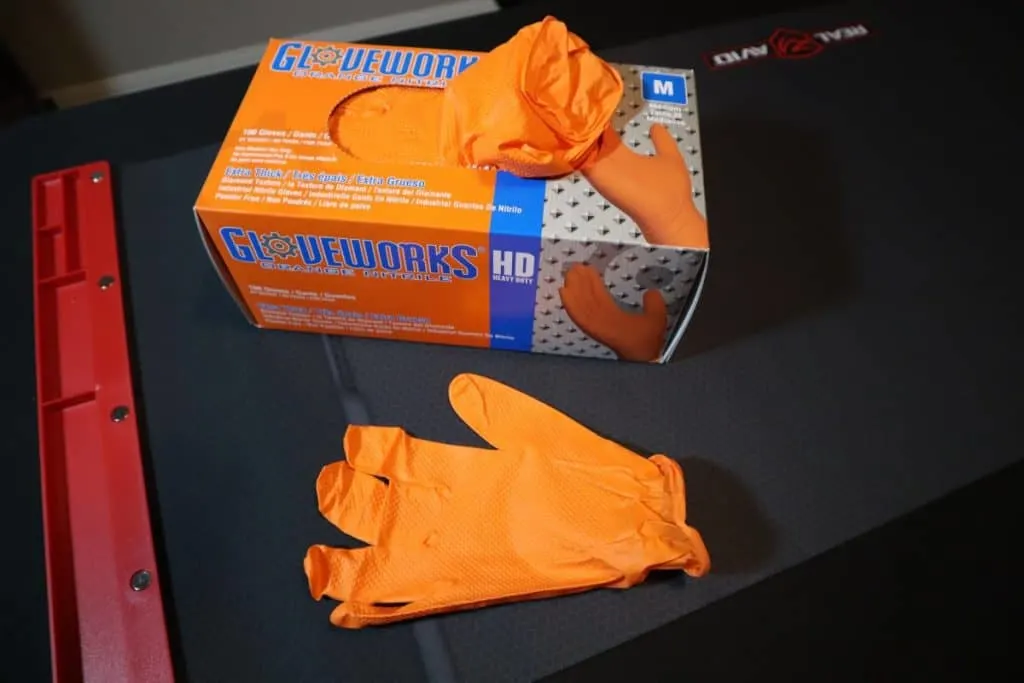
If anything, it keeps my hands from getting stained with carbon. I like being able to just pull the gloves off after working on a firearm and not need to wash my hands to the bone.
I use the Gloveworks Nitrile Heavy Duty Gloves (link to Amazon) in the 8 mil industrial orange.
A cleaning mat can help protect whatever surface your using to clean your weapon on. Well, so could a towel. The only reason I switched to mats was because I found ones that have little pockets or depressions in the mat to hold parts.
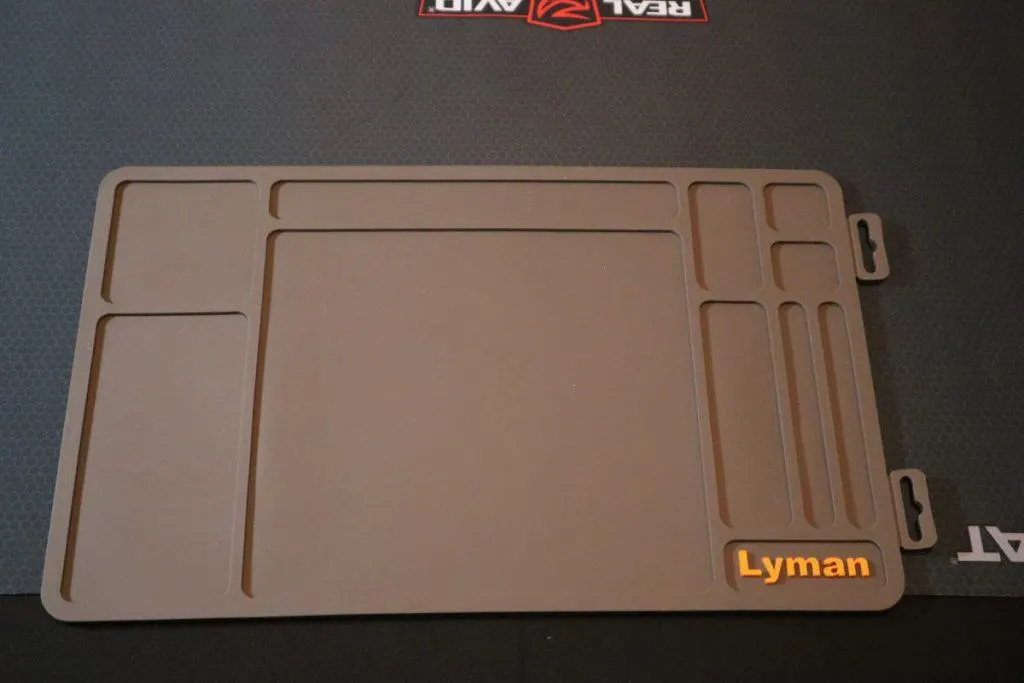
The two mats I use the most are the Lyman Maintenance Mat for handguns, and the Real Avid Universal Mat for rifles. (links to Amazon)
The cheapest thing to do is to use a towel and some rags. Have a little try nearby to keep parts in and your good to go. The reason I switched to mats is that they’re easy to clean, hold parts nicely, and are pretty durable.
